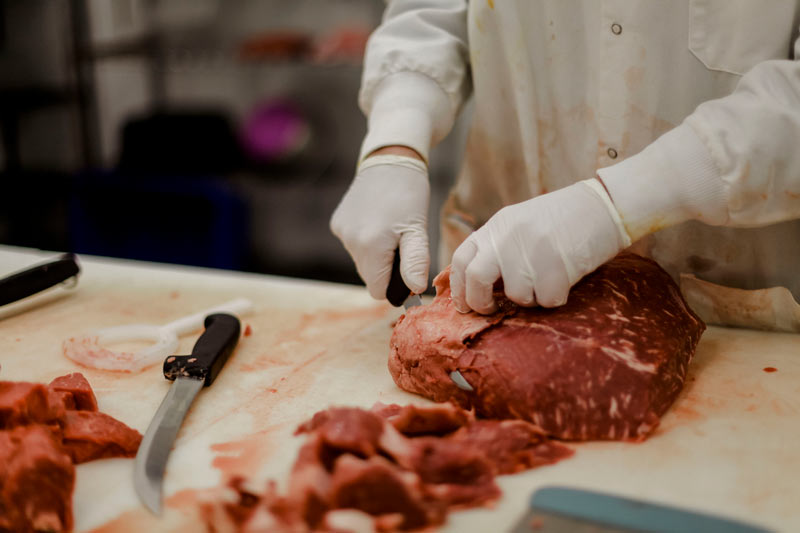Exploring the quality selections at bagley meat market edwardsville il for everyday meals.
The Total Overview to Exploring Your Neighborhood Meat Market: Advantages and Offerings
Exploring a regional meat market can expose a series of advantages that expand past plain shopping. These markets typically offer fresher and a lot more diverse alternatives contrasted to traditional food store. They also present a chance to involve with knowledgeable personnel that can guide clients in their selections. However, the benefits do not stop there. Comprehending the more comprehensive effects of neighborhood sourcing may alter the way one comes close to meat usage completely. What various other insights wait for those ready to discover?
Understanding the Worth of Neighborhood Sourcing
Although lots of customers may overlook the advantages, regional sourcing in meat markets offers considerable advantages that expand beyond mere ease - meat markets edwardsville il. By acquiring meat from local providers, customers typically appreciate fresher items, as these meats are usually processed and marketed more rapidly than those sourced from distant ranches. This quality not only boosts taste but also supports better dietary value
Local sourcing adds to the local economic situation, aiding little farmers and services thrive while minimizing the carbon impact associated with long-distance transport. Consumers can also acquire a much deeper understanding of the sourcing techniques, fostering a connection to the regional farming area. This openness commonly leads to greater animal well-being requirements, as neighborhood producers are more probable to implement ethical techniques. Eventually, choosing locally sourced meats encourages consumers to make enlightened decisions that benefit both their wellness and their community, developing a more sustainable food system.
Exploring One-of-a-kind Cuts and Specialized Meats
Neighborhood meat markets typically feature distinct cuts and specialized meats that might not be located in larger grocery stores. These artisan offerings can consist of unusual varieties, showcasing the diversity of regional livestock. Checking out these options enables consumers to discover new flavors and support regional farmers.
Local Artisan Offerings
What special tastes and textures await at an area meat market? Neighborhood artisan offerings present an array of unique cuts and specialized meats that provide to varied culinary preferences. From heritage types to dry-aged beef, clients can discover premium items not normally found in grocery stores. Craftsmen butchers typically concentrate on sustainable and honest sourcing, guaranteeing that meats are raised humanely and with care. Distinct preparations, such as house-made sausages and charcuterie, showcase the skills and imagination of local artisans, inviting exploration and trial and error in home cooking. In addition, seasonal offerings highlight neighborhood flavors, permitting consumers to get in touch with their community and support local business. Accepting these artisan products can boost any dish and boost the general dining experience.
Unusual Meat Selections
Discovering the offerings at an area meat market reveals an appealing option of rare meat varieties that can boost culinary experiences. One-of-a-kind cuts such as bison ribeye, lamb neck, and goat shoulder offer customers the chance to explore tastes and appearances that differ from traditional meats (bagleys edwardsville il). Specialty things like venison, wild boar, and also video game birds provide a preference of the exotic, appealing to adventurous tastes. In addition, these markets usually resource sustainably raised animals, making certain high quality and honest methods. Experienced butchers can suggest cooking approaches and pairings, improving the total dining experience. By embracing these uncommon ranges, home chefs can develop remarkable dishes that celebrate varied cooking practices and showcase the splendor of local farming
The Importance of Sustainability in Meat Manufacturing
Sustainability in meat manufacturing plays a necessary function in forming moral farming practices and minimizing environmental impact. By prioritizing local sourcing, consumers can support farms that prioritize pet well-being and sustainable approaches. This focus not just profits the ecosystem yet also promotes a more powerful link in between producers and their communities.
Ethical Farming Practices
How do moral farming methods add to a much more sustainable meat production system? These practices prioritize animal welfare, ensuring that animals are raised in humane problems. By offering pets with ample area, access to pasture, and an all-natural diet, ethical farming boosts their health and well-being, bring about higher-quality meat products. Ethical ranches typically apply rotational grazing and other lasting methods that promote soil health and biodiversity. This method minimizes dependence on artificial inputs and aids maintain local communities. In addition, honest farming cultivates a link in between producers and customers, motivating openness and accountability in the food supply chain. Inevitably, these practices not only benefit pets but additionally add to a more sustainable and resilient farming system.
Environmental Effect Reduction
As the demand for meat remains to increase, the importance of decreasing environmental effects in meat manufacturing ends up being significantly apparent. Traditional meat manufacturing is linked to significant greenhouse gas discharges, deforestation, and water deficiency. Sustainable methods, such as rotational grazing and integrated crop-livestock systems, can mitigate these impacts by advertising dirt health and reducing reliance on chemical inputs. Additionally, spending in regional meat markets motivates manufacturers to adopt environmentally friendly practices, as customers progressively prioritize sustainability. By choosing meat resources that focus on animal well-being and environmental stewardship, people can add to a more sustainable food system. Eventually, recognizing the environmental effects of meat manufacturing equips consumers to make informed selections that sustain both their health and wellness and the planet's wellness.
Regional Sourcing Advantages
While several consumers may not realize it, neighborhood sourcing of meat greatly boosts sustainability in food production. By supporting regional farms, customers reduce the carbon impact related to long-distance transportation. In addition, neighborhood meat manufacturers often use a lot more ecologically friendly and humane techniques compared to large-scale industrial procedures. This approach cultivates biodiversity and advertises animal well-being. Furthermore, local sourcing strengthens the regional economic climate by keeping funds within the community and motivating sustainable agricultural practices. It likewise allows customers to develop a deeper connection with their food resources, promoting transparency in production approaches. Inevitably, prioritizing local meat not only advantages private health and wellness yet also contributes favorably to environmental sustainability, making it a responsible option for conscientious customers.

Building Relationships With Your Butcher
Developing a relationship with a local butcher can greatly enhance the meat-buying experience. Establishing a link cultivates trust, allowing customers to seek customized referrals customized to their culinary needs. An educated butcher can provide understandings into the most effective cuts for particular recipes, prep work techniques, and cooking times, changing a basic purchasing trip into an instructional experience.
Additionally, regular interactions can cause unique deals or accessibility to specialized products not available to the general public. A butcher that understands their clients is a lot more likely to focus on top quality and freshness, making sure fulfillment with every purchase. Additionally, this relationship can motivate a feeling of home neighborhood, as consumers really feel more linked to the neighborhood food network. Engaging with a butcher not just enhances the consumer's understanding of meat products but also sustains local businesses, producing an equally valuable relationship that thrives on trust fund and top quality service.
Tips for Choosing the very best Meats
When picking the very best meats, consumers need to focus on several key aspects that guarantee both high quality and taste. Initially, freshness is crucial; meat needs to have a vivid color and a tidy, pleasurable scent. Customers should also examine the marbling, as intramuscular fat boosts tenderness and taste. In addition, comprehending the cut is important; different cuts serve different cooking techniques and recipes, so knowing the intended use can guide choices properly.
One more important facet is sourcing; buying from trustworthy suppliers or neighborhood butchers typically implies better requirements. Consumers must ask about the meat's beginning and any methods connected to pet well-being or feeding. Finally, looking for proper packaging and storage space at the market can suggest how well the meat has actually been looked after. By taking into consideration these variables, customers can make enlightened choices that result in an extra satisfying cooking experience.
Sustaining Regional Economic Situations and Communities
Sustaining local economies and neighborhoods is an often-overlooked advantage of buying at local meat markets. When consumers select to buy from these facilities, they contribute straight to the resources of neighborhood farmers, breeders, and craftsmens. This assistance promotes a lasting farming system and reinforces regional economies, as cash invested in your area tends to distribute within the neighborhood, creating tasks and enhancing neighborhood infrastructure.
Furthermore, local meat markets commonly source their items from nearby farms, decreasing transport costs and carbon impacts. This not just promotes ecological sustainability however likewise permits consumers to appreciate fresher, higher-quality meats.
Additionally, these markets frequently take part in area campaigns, such as funding local events or sustaining food banks. By focusing on neighborhood meat markets, consumers play a necessary function in nurturing their areas and ensuring the survival of tiny businesses, which eventually improves the social textile of the location.
Often Asked Inquiries

What Are the Normal Operating Hours of Regional Meat Markets?
Normal operating hours for neighborhood meat markets often vary, however several open in between 7 AM and 9 AM, closing between 5 PM and 7 PM. Some might additionally provide prolonged hours on weekends for convenience.
Do Regional Meat Markets Deal Delivery Services?
Many regional meat markets do provide distribution services, although schedule differs by area. Clients ought to make inquiries directly with their local market to verify whether this solution is offered and any kind of associated costs or problems.
Exist Vegetarian Options Available at Meat Markets?
Many regional meat markets do provide vegetarian choices, such as plant-based sausages, marinaded veggies, and specialized cheeses. These choices satisfy varied dietary choices, appealing to both meat lovers and those looking for meat alternatives.
How Can I Discover a Neighborhood Meat Market Near Me?


To discover a neighborhood meat market, one can browse online with directories or maps, ask next-door neighbors for recommendations, or go to local farmers' markets that often include suppliers concentrating on meat products.
What Settlement Methods Do Local Meat Markets Accept?
Neighborhood meat markets typically accept different repayment techniques, including cash money, debit, and credit rating cards. Some may also supply mobile settlement options or commitment programs, improving comfort and encouraging repeat company among their consumers.
By purchasing meat from local providers, customers typically delight in fresher products, as these meats are normally refined and offered a lot more swiftly than those sourced from image source remote farms. Local meat markets often include distinct cuts and specialty meats that might not be found in bigger grocery stores. Exploring the offerings at a neighborhood meat market discloses an intriguing choice of uncommon meat ranges that can boost culinary experiences - bagleys edwardsville il. As the need for meat proceeds to climb, image source the relevance of lowering ecological influences in meat manufacturing ends up being increasingly evident. Supporting regional economic climates and communities is an often-overlooked benefit of buying at neighborhood meat markets